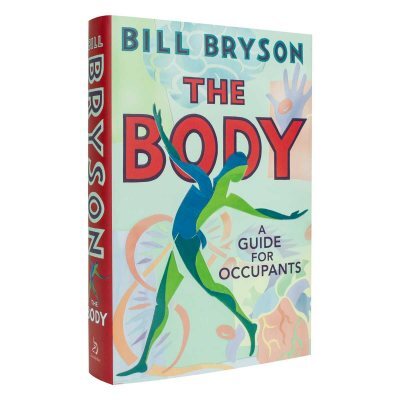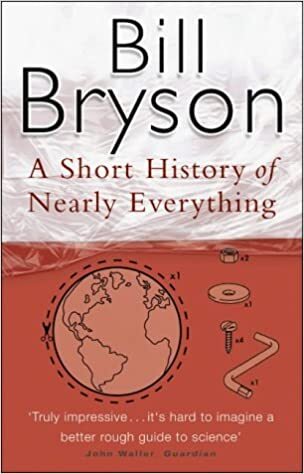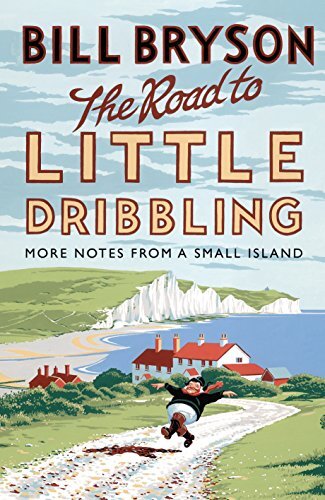No, I do not want to read Bill Bryson's latest book
It’s my 33rd birthday. I open my girlfriend's present: it’s Bill Bryson‘s latest book, The Body, a book about the human body.
I pretend to like the book. I want to like the book. I like Bill Bryson. Don't I?
I do like Bill Bryson's books, or at least, some of them. 1991, Neither Here nor There: Travels in Europe: a great book. It’s the kind of book that makes you laugh out loud, makes you think This book is the funniest thing I've ever read. Why have I never heard of it before?, makes you want to share the best parts with the stranger sitting next to you on the train. 1995, Notes from a Small Island: one of Bill’s best works. He travels across Britain, stays in cheap hotels, and somehow manages to capture the very essence that is England. 1998, Notes from a Big Country: my favourite Bill Bryson Book. It’s the book that made me want to become an American – a book so good that I wanted to change my nationality because of it.
But then there's The Body.
The Body

I tried to read The Body but I only made it halfway of the second chapter before I had to stop. I think Bill is losing his talents as he ages. In this book, he presents fact after facts about the human body. This is all very interesting Bill, but where are the funny anecdotes about your life? I don’t see any in this book.
Reading The Body is like experiencing the D Day landings. I am there, wading through water, blood-soaked by the blood of my fellow soldiers, and Bill is there, shooting at me with a machine gun, except this machine gun isn’t shooting out bullets, it’s shooting out facts. Fact after fact after fact.
Change of metaphor: he’s like the annoying kid in school who has a weird obsession about a particular niche interest, like butterflies, dinosaurs or steam trains. And this kid has all these facts memorised and he just wants to tell them to you – “there are 206 bones in the adult body” – “pterodactyl shit was yellow” – “steam trains are actually neither steam nor trains”. He just keeps going on and on, fact after fact, until my brain screams for mercy. Have mercy on me, Bill! There are only so many facts my brain can take before it explodes. That number is probably about three. Three facts. That’s all my mind can take. Whereas the number of facts in any chapter of The Body is over one hundred, easily.
Sometimes I take The Body down from my bookshelf and open it, and I immediately regret it. Opening the book is like opening Pandora’s chest or the Arc of the Covenant from Raiders of the Lost Arc. But instead of a plague of locusts or the evil undead, Bill pops out, and he immediately starts spouting fact after fact about the workings of the human body, going into more detail than you ever wanted to know. And he doesn’t care if you are not paying attention. He just keeps going on and on like a child with Asperger’s. Fact after fact about the human body. Facts I never wanted to know nor will I remember after reading the book. The only way I can stop Bill is by closing the book and putting it back on the shelf, but I can still see the spine, and it taunts me, like a dancing demon trapped in a bottle.
Where are the anecdotes? Where is the humour that Bill is so famous for? Where are the funny stories? These are not here. They are in his other books, the ones from the 1990s. These were written by an earlier Bill, a younger Bill. You see, there are two Bills, there are actually two Bills, they are two separate people, and I call them Young Bill and Old Bill, though I could also call them pre-2000 Bill and post-2000 Bill. (Maybe that was what we really should have been worried about at the turn of the millennium – not the millennium bug, but Bill’s career.) Young Bill is funny, witty, and likeable. Old Bill, on the other hand, is grumpy, unfunny, and intensely obsessed with random topics like the human body.
And it saddens me more than anything. It saddens me that this is what old age does to people. It’s what old-age will do to me and you. We will no longer be the people we once were. Unless you die early, that is, in your prime like Jimi Hendrix, Kurt Cobain and Jade Goody. To quote Harvey Dent: you either die a hero, or you live long enough to become the villain. (Now I’m imagining Bill Bryson as a supervillain, sitting in his lair on a volcano, stroking a white cat and writing another book.)
A Short History of Nearly Everything

For me, Bill's decline all started in 2003 with A Short History of Nearly Everything. At the time, I thought, this book is made for me. My reasons for thinking this were threefold: one, I liked Bill Bryson, two, I wanted to be a scientist and the book was about science, and three, the title impressed me: A Short History of Nearly Everything. I took the title literally. I believed this book actually did cover nearly everything, including all of history, science, space and time. Doctor Who must be in there, I reckoned. So must Final Fantasy. They must be because the title of the book says so. And Bill wouldn’t lie to me – would he?
Part of me knew that it wasn’t really possible for a single hardback book to cover every topic in the universe, but another part of me believed it could – that was Bill’s magic, you see. If Bill said his book contained nearly everything, just a book of 500 pages, then he must be telling the truth. Somehow, he had done it.
One day my brother saw me reading the book.
"What are you reading?"
"A Short History of Nearly Everything."
"What's it about?"
"Everything. Well, nearly everything."
"Everything? So Tamagotchis are in it?"
"Yeah. Well, I mean, probably."
"How about Power Rangers?"
"Power Rangers are in it too. I think."
"Wow."
I read the book. Tamagotchis weren't in it. Neither were Power Rangers. It was just a history of science, not "nearly everything" as Bill had promised me.
And the book itself. It’s the history of science and the universe. I mean, that could be interesting, but is that why I read Bill Bryson? No. I read Bill Bryson for his anecdotes about his mishaps abroad, or his sharp insights into American culture, not the life of Mary fucking Curie. Okay, she cured cancer or something, but do I want to read about her? No, I don’t.
I wanted to like A Short History of Nearly Everything. Everyone else seemed to love it. But I didn’t. The book was just fact after fact after fact.
The Road to Little Dribbling

Maybe the problem is that Bill is simply too rich to be relatable anymore. When he was younger, at the height of his writing powers, he was also poor, and that made him relatable. He had to stay in cheap hotels and take cheap modes of transport. He didn’t have the millions he has today. This meant he had funny, interesting and relatable experiences. He then wrote about their experiences and made a book. The book was called Notes from a Small Country. Decades later, he made the same book, but under a different title, The Road to Little Dribbling, where he basically does the same thing as before, he travels around Britain and writes about it. The first book is one of my favourite books. It’s poignant, sharp, and funny. The second is it’s just not as good. It’s like Bill is a shadow of his former self.
Maybe that’s why he called his book The Road to Little Dribbling. It’s referring to the road to old-age, where you become incontinent and you have a little bit of dribble rolling down your chin. Bill has become self-aware. I think we need to take a page from Quentin Tarantino and kill Bill before the curse gets any worse. Because who knows what annoying books he might make between now and his death?
So, in summary, I’ve gone off Bill Bryson. I haven’t actually liked any of his books since Notes from a Big Country in 1998. You could say I’m a fan of old school Bryson. I don’t like any of this new school Bryson stuff.


Leave a comment